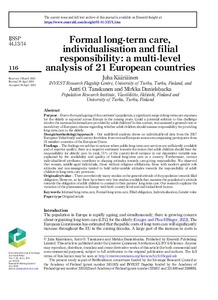Formal long-term care, individualisation and filial responsibility : a multi-level analysis of 21 European countries
Kääriäinen, Juha; Tanskanen, Antti O.; Danielsbacka, Mirkka
https://urn.fi/URN:NBN:fi-fe2025082791909
Tiivistelmä
Purpose: Due to the rapid ageing of the continent's population, a significant surge in long-term care expenses for the elderly is expected across Europe in the coming years. Could a potential solution to this challenge involve the increased informal care provided by adult children? In this context, we examined a general view or moral duty of European citizens regarding whether adult children should assume responsibility for providing long-term care to the elderly.
Design/methodology/approach: Our multilevel analysis draws on individual-level data from the 2017 European Value Study and country-level data from various European sources encompassing participants from 21 member countries of the European Union.
Findings: The findings reveal that in nations where public long-term care services are sufficiently available and of superior quality, there is a negative sentiment towards the notion that adult children should bear the responsibility for elderly care. In total, 71% of the country-level variance in our dependent variable was explained by the availability and quality of formal long-term care in a country. Furthermore, various individual-level attributes contribute to shaping attitudes towards care-giving responsibility. We observed that women, middle-aged individuals, those without religious affiliations, those with modern gender role attitudes and non-immigrants tended to hold unfavourable attitudes towards the responsibility of adult children in long-term care provision.
Originality/value: There are relatively many studies on the general attitude of the population towards filial obligation. However, so far there have been very few studies available that examine the population's attitude towards the obligation of adult children to commit to their parents' long-term care. Our research explains the variation of the phenomenon in Europe with both country-level and individual-level factors. © 2024, Juha Kääriäinen, Antti O. Tanskanen and Mirkka Danielsbacka.
Kokoelmat
- Rinnakkaistallenteet [27094]
